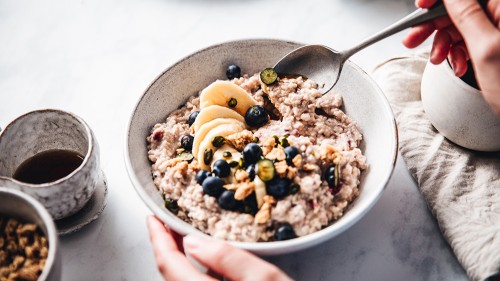A Dietitian Explains If You Should Count Calories for Weight Loss
Published on January 11, 2022
Medically Reviewed by Anthony Dugarte, MD
Calorie counting — while an effective tool — isn't the best approach to weight loss for everyone. Learn about the pros and cons so you can determine whether calorie counting is right for you.


Many people desire to lose weight, whether for reasons related to appearance, health, mood, energy, or something different.
One popular tool for weight loss is calorie counting.
Calorie counting is based on the concept of calories in versus calories out — if you eat fewer calories than you burn, you lose weight.
While an effective approach for weight loss, tracking calories is an imperfect science, and it isn’t always necessary to achieve lasting weight loss.
Why Calories Matter
While hotly debated, weight loss comes down to energy balance.
When talking about energy balance, there are two sides to the equation — calorie (or energy) intake and expenditure (1).
The intake side consists of all the calories you consume from foods and beverages.
The expenditure side (consisting of three different components) is a bit more complicated.
The three components of energy expenditure include (1):
- Resting energy expenditure (REE). This represents the number of calories your body burns at rest and comprises about two-thirds of energy expenditure.
- Thermic effect of food (TEE). This refers to the calories you need to digest and process food. Protein requires the most energy to digest, followed by carbs and fats.
- Activity energy expenditure (AEE). This is the calories you burn during sport-like exercise and nonexercise-related activities like yard work, walking to work, or fidgeting.
To lose weight, you must reach and maintain a calorie deficit, which means you consume fewer calories than your body expends each day.
You can create a calorie deficit by decreasing your calorie intake, increasing your calorie expenditure through exercise, or a combination of the two.
However, if you had to choose between diet or exercise alone, research suggests that it’s much more effective and sustainable to create a calorie deficit through diet, since not everyone has the motivation or time to burn enough calories with exercise daily (2).
Summary
To lose weight, you must consistently eat fewer calories than your body needs to support normal bodily functions, digest and absorb food, and support physical activity.
Benefits of Calorie Counting
Counting calories or keeping a food journal is an evidence-based self-monitoring technique that can help with weight loss in several ways.
It Allows You to Learn About Food
Doing so allows you to identify how different foods fit into your daily calorie budget and why limiting certain ones is necessary to stay within this budget and keep your hunger under control.
For example, foods rich in calories like pizza, ice cream, and fried foods can take up a large portion of your budget, and they may not do much to keep you satiated or full.
Conversely, foods low in calories but rich in nutrients like fruits, vegetables, whole grains, and lean proteins consume less of your calorie budget and contain nutrients beneficial for weight loss, like fiber and protein.
It Allows Reflection and Correction
Being able to reflect on past behaviors or habits allows you to identify how they pushed you closer or further from your goals.
If you haven’t been losing weight at the pace you would like or have been on a weight-loss plateau for some time, you can reflect to identify potential reasons for those issues and develop a plan to correct them.
Tracking calories and keeping a food journal also allows you to identify instances where you may have exceeded your calorie goal and what factors led you to do so.
For example, you might notice that you’re hungrier the day after a poor night’s sleep and that led to you eating more calories.
Or you might notice that you crave and have a difficult time saying no to sweets when you’re stressed.
Without calorie counting and food journaling, it can be difficult to identify these relationships that may be sabotaging your weight-loss efforts and, therefore, impossible to correct or at least work to improve on (3).
It Provides Structure
Classes, routines, and habits provide structure to our lives, helping provide a sense of security.
Calorie counting is no different — it can provide reassurance that you’re in control and on the right track to meet your weight-loss goal.
The structure calorie counting provides can be particularly important for when you first embark on your weight-loss journey and when you are close to meeting your weight-loss goal.
Summary
Counting calories allows you to learn how different foods fit within your calorie budget, allows you to reflect on your eating habits and identify factors that may be limiting your results, and provides some structure.
Drawbacks of Calorie Counting
While a useful tool for weight loss, calorie counting is not for everyone.
May Encourage Disordered Eating
Calorie counting may lead to disordered eating habits in certain people.
Disordered eating shares some of the same behaviors as an eating disorder, but they are not the same — an eating disorder is a much more serious illness.
Disordered eating refers to a variety of unhealthy eating behaviors, which may include food restriction, binge eating, or a rigid approach to eating, such as only eating certain foods or refusing to eat outside of one’s own home.
While calorie counting itself isn’t a sign of disordered eating, it can lead to the behavior in people with depression-related symptoms and body dissatisfaction (4).
As such, if you have a mental illness or persistent negative thoughts and feelings about your body, calorie counting may not be the best approach to weight loss.
Can Be Boring and Time-Consuming
Calorie counting isn’t all that exciting and requires a time commitment.
These factors can prevent people from trying calorie counting in the first place or cause others to give up on calorie counting shortly after starting.
While the monotony and time commitment of calorie counting are factors to consider, the development of mobile apps has made it easier than ever to track.
It’s Not Exact
Calorie counting is not an exact science.
The calorie number you see on food packages aren’t always accurate — there may be more or fewer calories in the product than what the label says (5).
In fact, the Food and Drug Administration (FDA) allows for a 20% margin of error for calories (6).
Even if the calorie number was accurate, cooking or mechanically altering the food changes the number of calories available for digestion, and food labels don’t usually reflect that (6).
Human error also makes calorie counting an inexact science. People aren’t always the best at measuring portions, making it easy to accidentally consume more calories than intended.
Summary
Counting calories can trigger disorder eating patterns in some people, it can be boring and time-consuming, and it’s far from an exact science.
Should You Count Calories for Weight Loss?
Calorie counting is a great tool to have in your toolbox for weight loss.
It allows you to learn how different foods fit within your daily calorie budget, allows reflection or correction, and provides structure.
However, it can encourage disordered eating in some people, can be boring and time-consuming, and it’s an imperfect science.
It’s important to weigh these pros and cons of calorie counting in determining whether it’s right for you.
In either case, counting calories isn’t required to lose weight. In fact, most people can lose weight by reducing their portions sizes.
Instead of eating two cups of rice with dinner, have one. Instead of drinking two sodas per day, drink one.
These are relatively small changes that can result in a significant amount of weight loss when practiced daily.
Filling your plate with more nutrient-dense foods like fruits, vegetables, and lean proteins can also help you lose weight without counting calories.
By incorporating more of these foods, you’ll have less room and cravings for ultra-processed foods like sugary drinks, frozen entrees, processed meats, sweetened breakfast cereals, and packaged snacks, which tend to increase hunger and drive weight gain (7).
Summary
Carefully weigh the pros and cons of calorie counting to determine whether it’s right for you.
How to Get Started
If you wish to start counting your calories, you must first calculate your maintenance calories — the number of calories you need to maintain your weight.
You can use an online calorie calculator to get an estimate of your maintenance calories.
Once you know your maintenance calories, subtract 300–500 calories to get your calorie goal for weight loss.
For example, if your estimated maintenance calories were 2,500, your calorie goal for weight loss would be 2,000–2,200 calories per day.
As you lose weight (usually every 10% loss in body weight or about 15–20 pounds), you will have to recalculate your maintenance calories and lower your calorie goal for continued weight loss (1).
This is because your burn fewer calories at rest and during exercise as you lose weight.
To track your calories, you can keep a journal and record the calorie information from the labels, or you can use a calorie-counting app.
Remember to track all the foods you eat and beverages you drink. Also, don’t forget to track condiments, sauces, and other calorie-containing ingredients.
If you decide to give calorie counting a try, there are several user-friendly mobile apps you can use.
The MyFitnessPal app is a great choice and one that I routinely recommend for patients when calorie counting and food journaling is a good fit.
You can use the app for free or subscribe to a monthly or yearly plan, which includes more tools and resources such as meal plans and custom settings for macronutrient tracking.
MyFitnessPal, like most other apps, allows you to scan a food barcode to log foods, or you can search for the item. Though, searching for the food item may not always be the most accurate.
Other popular apps for tracking calories include:
- MyNetDiary
- Lose it!
- Calorie Counter +
- MyPlate Calorie Counter
Keep in mind that tracking calories isn’t something you have to do forever.
Once you do it long enough, you get a good idea of the calorie content of foods based on your portion size.
If you’re like me and usually eat the same types of food each day, it’s also easy to know where your calories are after tracking for a short time.
Summary
To get started with calorie counting, first determine your calorie goal by estimating your maintenance calories and then subtracting 300–500 calories. You can track your calories using a journal or download an app to your phone.
Frequently Asked Questions
Is counting calories the best way to lose weight?
Calorie counting is one tool you can use to maintain a calorie deficit, which is required to lose weight. While a good tool for some, it may not be the best way to lose weight for others.
Is counting calories healthy?
Counting calories is neither healthy nor unhealthy — it's simply a tool to help you lose weight. However, counting calories can be problematic for people with mental illness or body dissatisfaction.
Should I count calories or just eat healthy?
Counting calories is an evidence-based tool for losing weight. But you should carefully weigh the pros and cons of doing so to determine whether it's right for you.
How to count calories when eating out?
Restaurants that are part of a chain of 20 or more locations are required to provide calorie and nutrition information of the food they serve.
Most other restaurants also voluntarily display this information. Most restaurants also post nutrition information online so you can plan ahead.
What are trace calories?
The FDA does not define trace calories, but it generally refers to fewer than 5 calories.
Many products labeled as calorie-free will contain trace calories, but if you consume several servings, you could end up consuming a significant number of calories.
The Bottom Line
While hotly debated, weight loss comes to calories in versus calories out.
Counting calories is an effective way to ensure you’re maintaining a calorie deficit while also providing structure and allowing you to identify trends in your eating habits that may be holding you back.
But the process is far from an exact science, and it may be harmful to people with mental illness or body dissatisfaction.
In either case, if you determine calorie counting is right for you, there are several intuitive calorie counting apps that you can use to help you reach your weight-loss goal.
At WellnessVerge, we only use reputable sources, including peer-reviewed medical journals and well-respected academic institutions.
- Energy balance and its components: implications for body weight regulation:
https://www.ncbi.nlm.nih.gov/pmc/articles/PMC3302369/ - Effect of diet and exercise, alone or combined, on weight and body composition in overweight-to-obese post-menopausal women:
https://www.ncbi.nlm.nih.gov/pmc/articles/PMC3406229/ - Body Recomposition: Can Trained Individuals Build Muscle and... : Strength & Conditioning Journal:
https://journals.lww.com/nsca-scj/fulltext/2020/10000/body_recomposition__can_trained_individuals_build.3.aspx - Risk Factors for Disordered Eating in Overweight Adolescents and Young Adults:
https://www.ncbi.nlm.nih.gov/pmc/articles/PMC4723677/ - Food Label Accuracy of Common Snack Foods:
https://www.ncbi.nlm.nih.gov/pmc/articles/PMC3605747/ - Cooking increases net energy gain from a lipid-rich food:
https://www.ncbi.nlm.nih.gov/pmc/articles/PMC4272645/ - Ultra-Processed Diets Cause Excess Calorie Intake and Weight Gain: An Inpatient Randomized Controlled Trial of Ad Libitum Food Intake - PubMed:
https://pubmed.ncbi.nlm.nih.gov/31105044/






